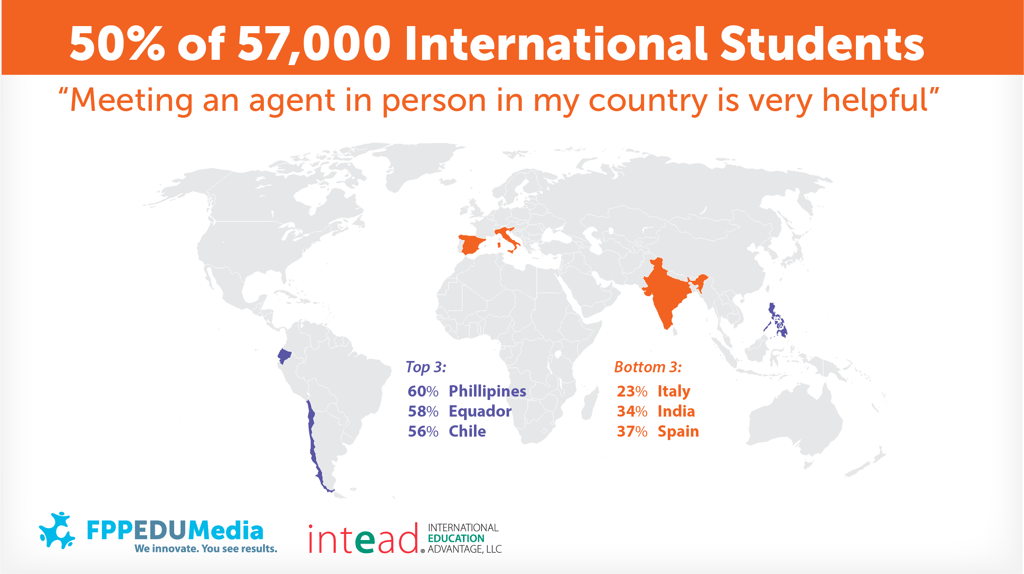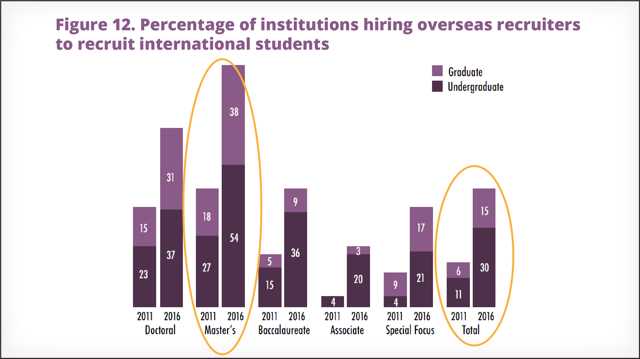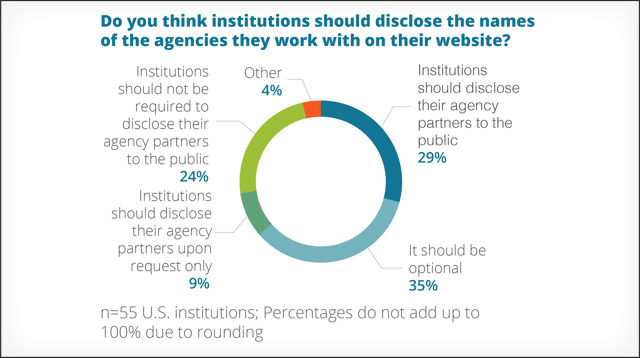
This week, we are taking a look back at one of the more controversial topics (still!) in international recruitment – the use of agents.
Originally, we thought this discussion was done when NACAC agreed that there was, in fact, an ethical way to engage agents to support your international student recruiting. Well…the debate wasn't quite over, for some.
We’ve all heard the education agent debate—how do I find and sustain ethical and productive relationships that benefit both my institution and my prospective students? How do I know whether I am working with the right agents? And ultimately—is using agents worth the risk? (Because we all know there are some bad actors out there).
This week we are taking a look at the regulations and a few of the underlying arguments and the evidence on either side.
In September of 2016, the National Association for College Admissions Counseling (NACAC) amended two parts in their guidance to U.S. educators on using education agents. This code of ethics, titled Statement of Principles of Good Practice (SPGP), was originally adopted in 2014. This document lays out the code of ethics and standards for the association and its members.
Then, in April of 2017, the U.S.-based Middle States Commission on Higher Education proposed new policy languages that would prohibit use of incentive-based compensation for international student recruitment. That objection eventually died on the vine.
Add to that the changes taking place in China and Vietnam around how these countries have recently relaxed regulations for recruiting agencies so that almost anyone can raise their hand and announce they are now a student recruiting shop.
Yet, the American Council on Education (ACE) recently released a report on internationalization efforts by U.S. institutions and they shared this: In 2011, 17% of respondents were engaged with education agents compared with 45% in 2016. Hello!
Our own recent research with FPP EDU Media that we presented at NAFSA in 2017 identified that 50% of international students find education agents helpful as they evaluate their options. And our sample size? More than 1M students surveyed resulted in 57,000+ student responses from 65 countries! (Find the link to our slides below). Those results are some of the most substantial and reliable in our industry.
Bottom Line: While the use of education agents by U.S. institutions is on the rise (considerably!), concerns about unethical practices are being addressed. Have you figured out where the best and most reliable agents are around the world? Is your institution too fearful of the downside? If so, you are probably not relying on THE recruiting channel that pretty much all institutions with any significant increase in international student population are using. And they use agents successfully. If your goal is to increase international student enrollment, ignore this recruiting channel at your own peril.
Read on to get some of the details of recent regulatory challenges and our insights into using agents to support your international student recruiting. This channel cannot be ignored. The risks are really only in whether you put the right processes in place to select and manage your recruiting team.
Have you talked to the recruiting team at University of Cincinnati? This institution, in the middle of the country (no oceans or coasts in sight), knows a thing or two about scaling international student enrollment and promoting what makes them a great choice. And they use agents. Successfully. They are big proponents of AIRC among other channels to identify and develop the best agent relationships. We could all learn a thing or two from them.
And they are just one example.
Hang onto your hats, this post is a long one. We hope you will find it valuable and sharable so that your colleagues with doubts about agent use can gain some important perspective.
Any institution starting to use the agent recruitment channel in the past year or so, and there are MANY of them, can tell you that this channel is highly competitive. Agents are in such demand that they are becoming highly selective about the universities they are willing to work with.
And if you have not already joined the ranks of our Intead Plus members who are downloading our Agent Management e-book (among so many other publications) as part of their membership, now is the time. This e-book presents best practices and tips shared by your peers from 50 institutions from around the world all using agents successfully.
Side note: Want the slides from our 2017 research with FPP EDU Media? Check them out here.
Now, let’s get into it.
Note the overall growth in use of recruiting agents from 17% in 2011 to 45% in 2016. And note the growth for Master's from 45% to 92% over that same period. Pretty significant.

Source: Mapping Internationalization on U.S. Campuses, ACE, 2017 Edition
Revisions adopted at the NACAC Assembly in 2016 advise U.S. institutions to instruct their agents to tell students when they receive referral commissions. Further, the amended code advises institutions to verify for students whether or not an agent is authorized to act on their behalf. These provisions will went into effect for the 2018 admissions cycle.
In 2016, the following was added to Article II.A of NACAC’s Statement of Principles of Good Practice (SPGP) to specify that members should:
- “In contracts with third party representatives, require those representatives to disclose to their student clients all institutions who are compensating them.”
- “In their promotional material for international students, institutions should offer to verify whether they have authorized any third party agents to represent them and indicate how students may request this verification.”
The International Association for College Admission Counseling (IACAC) raised a concern that has been circling around for some time – the practice of “double dipping.” When “double dipping,” education agents receive commissions from institutions as well as payments from students. In fact, from our point of view, this term is pejorative from the get go.
There are many industries (consider real estate) where parties on both sides of the deal pay a fee for services. Recruiting agents are providing a marketing service to the universities they represent while providing perspective, application and visa support to families. Both parties are receiving different services worthy of payment. “Double dipping” suggests something inappropriate is going on; someone is taking unfair advantage.
The agent community does not see it this way and Intead agrees with them. When folks perform services with transparency and communicate the arrangements clearly to all parties involved, no one is being taken advantage of. The onus is shared by the agent, the student/family and the university to ask the questions and share the information. If that is not happening, then yes, someone is taking advantage of the situation and is clearly not a reliable business partner. If this is what you see, we recommend you back away from these murky situations, quickly.
While the term "double dipping" has become an industry standard and you will hear it at virtually every conference when agents are discussed, we at Intead suggest the term be dropped from the conversation entirely. We all must treat our counterparts around the world with the same respect we expect from them (cross-cultural understanding anyone?). If specific bad actors reveal themselves, they should be identified as such and distance maintained. A rule in business transactions of all sorts and this really should not be surprising or raise any eyebrows for any of us.
The added language in NACAC’s statement fosters transparent communication about how agent fees work. The goal is that all parties involved, all consumers, understand the financial arrangements so they can make an informed decision.
Turning to the Middle States Commission: Inside Higher Ed wrote about the latest policy recommendations. Find the story here. Level heads prevailed and the recommendations were dropped.
And that ACE internationalization report we referenced above? You can find that here. An important view of how an increasing number of U.S. institutions are expanding their efforts to internationalize.
Criticism of education agents is harsh in the U.S., which is likely why institutions in the U.S. lag behind other countries in their use of agents. Education USA has nothing good to say about international recruiting agents, ever. But, many in this industry don’t just criticize the commission received by agents or the lack of transparency. Some severely disapprove of the lack of oversight and training for agents. And the detractors can be vocal. They have an important point. ICEF has some valuable educational opportunities to address best practices when developing agent relationships. Our advice: Take advantage of ICEF's wealth of knowledge on the subject.
We’ve said this all along, your international partners, whomever they are, must be part of your team. They must understand how to communicate the value of your institution. They cannot operate in a vacuum. If your institution is not taking time to train and manage your staff and partners well, what kind of results do you expect you will get?
Changes to policies and practices will undoubtedly offer more protection to international students. NACAC Assistant Director of International Initiatives Lindsay Addington says, “NACAC believes that having access to quality college counselling is crucial to students’ transition to higher education; we want to ensure that international students are treated ethically in the process.”
There is a noted rise in the use of educational agents by U.S. universities. A recent study from NAFSA indicated that nearly half of U.S. institutions use educational agents either directly or indirectly.
A study introduced by Bridge Education Group and Student Marketing at the NASFA conference in June 2016 revealed that 37% of U.S. universities and colleges use international student recruitment agencies. Additionally, the estimated share of international student enrollment via agencies is 22%. The study considered the stance of the U.S. on use of educational agents “mixed.” Clearly not everyone in the U.S. is comfortable with this recruiting channel. Which ultimately makes the channel more valuable to those who know how to work it well.
The UK, Canada, Australia and New Zealand are all considered “pro-agent,” obtaining as many as 62% of their international students via agencies.
The Bridge/Student Marketing research report also points out that the U.S. has not yet signed the London Statement aimed at enhancing the ethical standards of recruitment and ensuring better experiences for international students who use agencies to apply to universities abroad. This code says:
- practice responsible business ethics
- provide current, accurate and honest information in an ethical manner
- develop transparent business relationships with students and providers through the use of written agreements
- protect the interests of minors
- provide up-to-date information that enables international students to make informed choices when selecting which agent or consultant to employ.
- act professionally
- work with destination countries and providers to raise ethical standards and best practice.
With the increased use of agencies, there is more reason to sign on to such agreements and work internationally to ensure fair, transparent and ethical practices. The Bridge/Student Marketing study revealed that their respondents were unanimous on that point. Those surveyed agreed that increased transparency in the field would be a good thing. But, that doesn’t mean that they all agreed on what criteria are needed to meet the desired degree of “transparency.”

Source: Pace of Adoption of International Student Recruitment Agencies by U.S. Institutions, Bridge Education Group and Student Marketing, 2017
Most agree that to protect students, the relationship between agencies and universities should be disclosed. There is little agreement; however, on how agency agreements should be disclosed and what should remain confidential. Typically, those institutions wishing to keep their agency agreements confidential are simply trying to keep their valued business relationships to themselves. Listing your valued partners gives your competitor institutions the ability to hire those same agencies that you value so much and have worked hard to cultivate and train.
Tell us what you think in the comments! We know this topic brings out some feisty opinions. We welcome the debate. And we think the ethical approach to using agents is clear.
This post was originally published in June 2017, but has since been updated and expanded.

